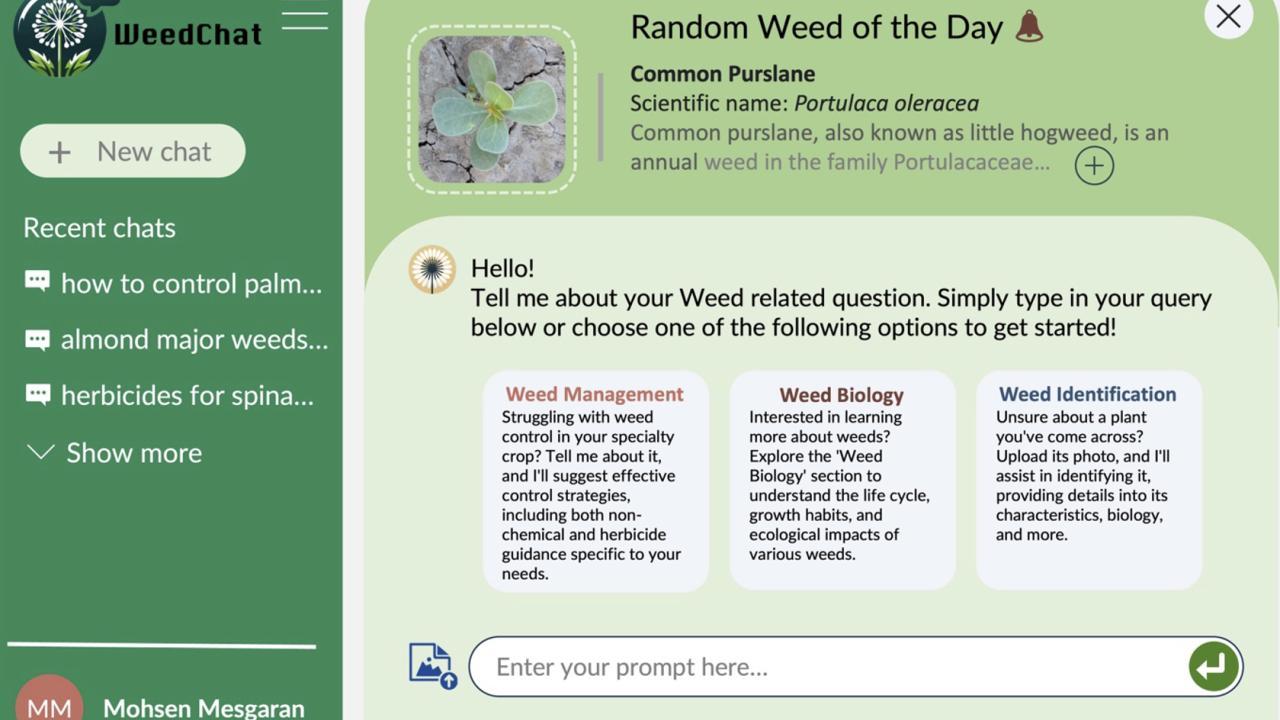Davis, California, USA
December 11, 2024
 These pretty little flowers are blooming on a parasitic weed in a tomato field. (Karin Higgins/UC Davis)
These pretty little flowers are blooming on a parasitic weed in a tomato field. (Karin Higgins/UC Davis)
Researchers at the University of California, Davis, are developing a chatbot powered by artificial intelligence to help growers, backyard gardeners, landowners and others identify and treat weeds.
WeedChat will have access to and train itself on a broad array of papers, books, journals and other data that allow it to provide real-time accurate, comprehensive information about weeds and invasive plants, said Mohsen Mesgaran, an assistant professor in the Department of Plant Sciences.
 A mockup of what the WeedChat app would look like. (Courtesy Mohsen Mesgaran/UC Davis)
A mockup of what the WeedChat app would look like. (Courtesy Mohsen Mesgaran/UC Davis)
“It’s just like a version of ChatGPT that you work with, but it will be trained, fine-tuned and with all the data we have on weeds,” Mesgaran said. “You can ask anything about weeds. It’s going to revolutionize the type of extension work that we’re doing. It’s true digital extension, or e-extension.”
The California Department of Food and Agriculture is funding the project with a nearly $430,000 award from its Specialty Crop Block Grant Program.
Comprehensive weed information
The initial version of WeedChat will be text-based, with users typing in questions. Future versions will allow image uploads and spoken questions akin to querying digital assistants like Apple’s Siri or Amazon’s Alexa.
WeedChat will be a free service that encompasses decades of research and up-to-date advice trained on millions of reference points, from weed and crop protection journals such as Weed Science, which date back to the 1950s, all the way to current guidance from resources like the UC Statewide Integrated Pest Management Program.
Weed scientists specialize in certain crops, pests or herbicides but WeedChat will have access to the universe of weed knowledge and will be updated regularly.
“You can ask anything and it will provide you all the information, compiling all the data, putting it all together and then synthesizing,” Mesgaran said.
Gathering the data and training
The most time-intensive part of developing WeedChat is compiling the database. The team will also train, validate and test the bot to ensure its accuracy, said Alireza Pourezza, an associate professor of Cooperative Extension in the Department of Biological and Agricultural Engineering.
 Assistant Professor Mohsen Mesgaran, in the UC Davis Department of Plant Sciences. (UC Davis)
Assistant Professor Mohsen Mesgaran, in the UC Davis Department of Plant Sciences. (UC Davis)
This process involves inputting data into the AI model, evaluating its responses to related queries for accuracy and refining the model’s performance. The team will also assess WeedChat’s ability to generate accurate responses when presented with new, previously unseen information.
“It’s sort of asking the machine to figure out the weed issue and recommend a relevant treatment,” Pourreza said.
Validation involves confirming the answers provided by WeedChat are consistently accurate.
“We want to fine-tune a model that generates more accurate and more consistent responses related to questions about different types of weeds, treatments, side effects and everything that the consumer needs to know about that specific weed and the herbicide that is needed, or any other biological control or mechanical control,” he said.
It will likely take two years before the project is finished, though a beta version may be shared with weed scientists prior to that for testing and feedback.